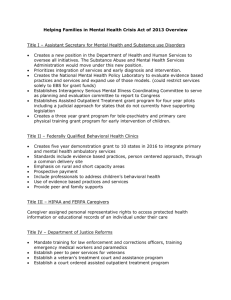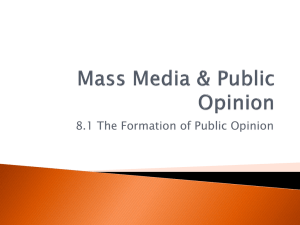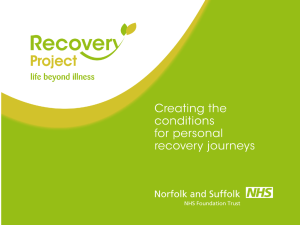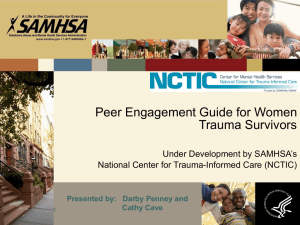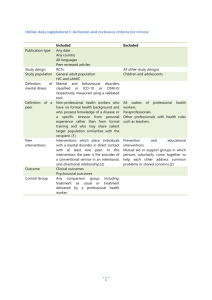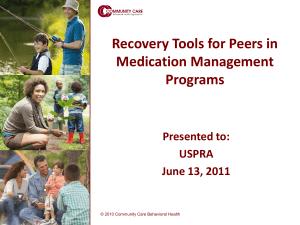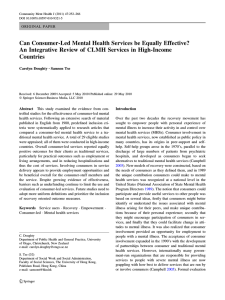View the PowerPoint Presentation
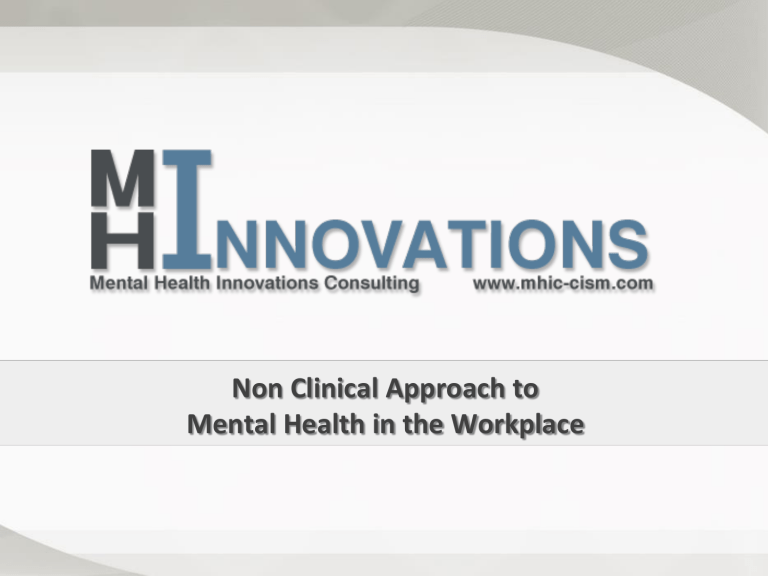
Non Clinical Approach to
Mental Health in the Workplace
Context
Context and factors that should motivate ACTION and INNOVATION
• Only 41% of employees feel they can acknowledge an illness and still get ahead in their careers
• 45% of benefits managers and middle managers reported knowing little or nothing about depression as an illness
Source: University of Michigan's Depression Center
Context and factors that should motivate ACTION and INNOVATION...
“….. the longer someone is ill, the more treatment resistant their illness becomes…..”
Source: Dr. Diane McIntosh (Psychiatrist)
Context and factors that should motivate ACTION and INNOVATION...
Only 35% seek treatment while the remaining 65% do not.
Source: Dr Richard Earle of the Canadian Institute of Stress
Context and factors that should motivate ACTION and INNOVATION...
• Disability represents anywhere from 4% to
12% of payroll costs in Canada
• Mental health claims (especially depression) have overtaken cardiovascular disease as the fastest growing category of disability costs in Canada
Source: Global Business and Economic Roundtable on Addiction and Mental Health
Struck Down
Set new paradigms
Healthy Reacting Injured Ill
Social
Social
Social
Social
Clinical
Adaptive coping
Clinical
Mild and reversible distress or functional impairment
Clinical
More severe, persistent injury or impairment
Clinical
Clinical illnesses and disorders requiring concentrated medical care
Set new paradigms
Mental Health
Stress Injuries Mental Illness
Set new paradigms
Stress Injury
TRAUMA FATIGUE GRIEF
MORAL
CONFLICT
Embrace the obvious
During
Before
After
Psychiatric
History
Childhood
Abuse
Other
Prior
Trauma
Trauma
Severity
Additional
Stressors
Lack of
Social Support
Journal of Consulting & Clinical Psychology - Brewin et al, 2000
Conceptual Peer Support Continuum
Future certified peer support workers
Clinical Care Peer Support
Formal Informal
Peer Peer
Support Support
Workplaces
MH System
Friendship
Peer Support “Blue Print”
Standards of Practice
Organizational requirements for success
Code of
Conduct
Competencies
Knowledge Experience
Principles of Practice
Core Values
Outcomes &
Evaluations Methods
Alone
References
[1] Creamer et al., Guidelines for Peer Support in High-Risk Organizations: An International Consensus Study Using the
Delphi Method. Journal of Traumatic Stress April 2012 Vol 25 pages 134–141
[2] O'Hagan, M., Cyr, C., McKee, H., & Priest, R. (2010). Making the case for peer support: Report to the Mental Health Commission of Canada
Mental Health Peer Support Project Committee. Calgary: Mental Health Commission of Canada.
[3] Provencher, Gagné & Legris, 2012; L’INTÉGRATION DE PAIRS AIDANTS DANS DES ÉQUIPES DE SUIVI ET DE SOUTIEN DANS LA
COMMUNAUTÉ: POINTS DE VUE DE DIVERS ACTEURS Rapport final de recherche (version sommaire) Université Laval Février 2012
[4] Chinman, Young, Hassell & Davidson, 2006; Toward the Implementation of Mental Health Consumer Provider Services ; The Journal of
Behavioral Health Services and Research Volume 33, Number 2 (2006), 176-195, DOI: 10.1007/s11414-006-9009-3
[5] Coatsworth-Puspoky, R., Forchuk, C., & Ward Griffin, C. (2006). Peer support relationships: an unexplored interpersonal process in mental health. Journal of Psychiatric and Mental Health; Nursing, Vol 13, 490-497.
[6] Corrigan, P.W. (2006). The impact of consumer-operated services on the empowerment and recovery of people with psychiatric disabilities.
Psychiatric Services, 57 , 1493-1496.
[7] Dumont JM, Jones K: Findings from a consumer/survivor defined alternative to psychiatric hospitalization in Outlook, Spring 2002, pp 4—6
[8] Sandra G. Resnick; Robert A. Rosenheck, 2008 Integrating Peer-Provided Services: A Quasi-experimental Study of Recovery Orientation,
Confidence, and Empowerment Psychiatric Services 2008;doi: 10.1176/appi.ps.59.11.1307
[9] Ochocka, J., Nelson, G., Janzen, R., & Trainor, J. (2006). A longitudinal study of mental health consumer/survivor initiatives: Part III - A qualitative study of impacts on new members. Journal of Community Psychology, 34, 273-283.
[10] Pfeiffer, Heisler, et al. (2011). "Efficacy of peer support interventions for depression: A meta-analysis." General Hospital Psychiatry 33(1):
29-36.
[11] Ratzlaff, S., McDiarmid, D.,Marty, D., & Rapp, C. (2006). The Kansas consumer as provider program:Measuring the effects of a supported education initiative. Psychiatric Rehabilitation Journal, 29(3), 174–182.
[12] Mclean J, Biggs H, Whitehead I, Pratt R, Maxwell M: Evaluation of the Delivering for Mental Health Peer Support
Worker Pilot Scheme. Edinburgh: Scottish Government Social Research, Research Findings No.87/2009;


